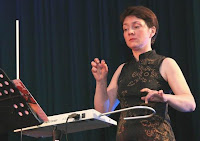This is just a brief intro to chord formation. There are still a lot more deeper stuff that i haven't come across with as well as its histories.
Usually, we name a chord as major (M) / minor(m) / diminished(dim) / augmented(aug) / dominant / sus4 / add9..
It's actually quite easy, chord forms via a combination of three notes, the 1st, 3rd and 5th. This is the most basic situation, developed since or even before the bach's era. So, what are these 1, 3 and 5? They are actually just 'dol', 'mi' and 'sol' in its respective scale. Say,
- When trying to get C major, use 1, 3 and 5 of C major scale.
- C minor? 1, 3 and 5 of C minor scale.
- same applies to diminished or augmented.
When you meet something like major 7 (CM7) , minor 7 (Cm7) or dominant 7 (C7), what to do?
- Actually is the same just play an extra 7th note of the respective scale.
- for dominant 7, b7 is played instead of 7th.
- sus4? Play 145 instead of 135. This will give a suspended feel since there is no 3rd note, which is particularly important in chord major/minor determination.
- add 9? even easier, just simply add a 9 to 135. it'll become 1235, since 2=9.
If you are playing chords with tension notes, it's quite important to ponder a while which note to throw away, and which note will be kept. Chords like G13 tends to eat up too much space and you have got not enough fingers on the left hand to play all the 1,3,5,7,9,11,13. So, we just take the important stuffs, like root (only if not playing with a bass instrument), 3rd, 7, 13.
3rd determine the characteristic of the chord (M/m/dim/aug..). 7th determine the 7th characteristic (M13, 13, m13 are all different). 13th is the note that causes us wanna use such a complicated chord.
Frankly, if you are playin' jazz, the score will write G7 instead of G13/Gb13 and stuff like that. This is because, G7 is the main feel that the song needed, the '7th' feel, but meanwhile, adding a tension note (becoming G13) is just to add a 'tension' taste to the '7th' feel, and every tension note has its own ways of resolving itself to a 'non-tension' realm. Someone may scold, "what are these 'FEEL' thingy!?" but it's very hard to explain, and still the same qoute, 'feel it, music or any other arts are very subjective!'
Have FUN!!




.jpg)




